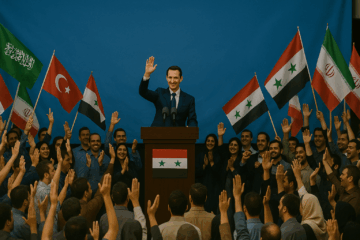In response to President Donald Trump’s letter to Iran’s supreme leader, Ali Khamenei, proposing a new nuclear deal, Khamenei’s stance was unequivocal: rejection, dismissing it as “deception of public opinion.” Yet, within the Iranian government, conflicting signals emerged, with some officials suggesting the offer was under consideration. This strategic ambiguity is not new. Khamenei employed the same tactic during negotiations for the collapsed Joint Comprehensive Plan of Action (JCPOA), allowing him to distance himself from any fallout should the deal collapse. Ultimately, however, history has shown that under pressure, the regime will capitulate—what Iran’s leaders call “drinking the poisoned chalice.” But assuming a new deal materializes, what would it mean for the people of Iran?
In 2018, President Donald Trump withdrew from the JCPOA, the nuclear agreement brokered by President Barack Obama in 2015, as it “failed to protect America’s national security interests.” Trump justified his withdrawal by arguing that the agreement, as “a windfall of cash”, did not curbed Iran’s malign activities. Instead, he contended, it provided financial resources that “enriched the Iranian regime and enabled its malign behavior.”
For Iran’s non-Persian national and ethnic groups, the failure of the JCPOA was also due to its disregard for human rights and domestic oppression. Western negotiators prioritized nuclear and missiles restrictions and regional security while sidelining the people’s suffering under an authoritarian regime. The economic relief from the deal landed in the hands of regime elites, particularly the Islamic Revolutionary Guard Corps (IRGC) and their affiliates. Ordinary peoples saw little benefit. Instead, the regime doubled down on its crackdown against marginalized groups, including Kurds, Baloch, and Arabs. With reduced external pressure, Tehran felt emboldened to impose its Persian-Shia ideological hegemony even more aggressively.
Now, with talks of a renewed deal resurfacing, one must ask: will this agreement, like its predecessor, serve only the regime’s interests? Trump’s letter outlined conditions for sanctions relief, including an end to Iran’s nuclear weapons program, cessation of uranium enrichment, ceasing financial support to Hezbollah and halting arms transfers to the Houthis, and dismantling its militias in Iraq. However, these terms, like before, fail to address the human rights abuses within Iran. If a future deal ignores these realities, it will once again be the oppressed groups who pay the price.
The absence of human rights considerations in Western negotiations with Iran is not incidental—it is a consistent pattern. Historically, the West has often prioritized short-term strategic gains over the long-term aspirations of the people in Iran. The result has been a cycle of diplomatic engagements that empower the ruling elite while leaving everyday people in a deepening state of economic hardship and political repression. Sanctions relief, while theoretically aimed at improving the people’s economy, has instead served as a financial injection for the regime’s military-industrial complex, allowing it to tighten its grip on power.
For Iran’s diverse population—comprising Baluchis, Kurds, Armenians, Qashqais, Azeris, Arabs, Turkmens, Gilakis, Tabaris, Talyshis, and religious groups including Jews and Bahais—a nuclear deal that fails to address their plight could be devastating. The regime’s persecution of non-Persian groups has been marked by disproportionate executions of Kurds and Baluchis, arbitrary detentions, and systematic cultural suppression. Economic marginalization has left these groups disproportionately affected by unemployment, poverty, and lack of access to basic services. A deal that does not explicitly condition sanctions relief on improvements in human rights will serve as yet another tool for the government to sustain its policies of repression and forced assimilation. Moreover, the suppression of dissent extends to students, journalists, and activists who have faced severe crackdowns for expressing opposition to the regime’s policies.
This regime operates outside conventional norms, yet Western commentators in mainstream media, instead of acknowledging the ideological and religious motives of Iran’s Shi’ite rulers, continue to search for rational justifications that overlook the regime’s true nature. If the past is any indication, a nuclear deal without guarantees for the people of Iran will reinforce the status quo: economic benefits funneled to regime elites, intensified repression of national and ethnic minorities, and continued expansion of Iran’s regional influence at the expense of its citizens. A more “comprehensive” approach to diplomacy with Iran must incorporate human rights as a core negotiating principle. Strict oversight and accountability measures must be implemented to prevent state-controlled entities, such as the judiciary, from imposing verdicts on the people, and the IRGC from monopolizing financial resources and oppressing dissidents. Furthermore, human rights organizations and genuine opposition figures should have a voice in shaping the terms of any agreement.
Ultimately, the goal of any nuclear deal should also aim to create conditions that empower its people to pursue democratic aspirations. A policy that prioritizes human rights alongside the security of Israel and the US would be strategically effective in fostering long-term stability in the region.
About the Author

Loqman Radpey
Dr. Loqman Radpey, an expert on Kurdistan and the Middle East, is a fellow at the Middle East Forum with over a decade of experience analyzing the legal and political dimensions of conflicts in the Middle East, including the Kurdistani regions in Iran, Iraq, Turkey, and Syria. He is the author of ‘Towards an Independent Kurdistan: Self-Determination in International Law’ (published by Routledge in 2023), the first comprehensive historico-legal account of Kurdish aspirations for statehood. His upcoming work, “Self-Determination during the Cold War”, will appear in ‘The Cambridge History of International Law’ (Volume XI).





Another thing to add is every taxi or taxi motorbike riders insisted on no tips and doing the right thing when it came to giving the Aussie the right change.
I cover the internal issues first. I have friends from Iran, one a small business owner and the other a GP/MD both early 30s. Both agree that change must come from within, not being too far away. Both entertain the idea that when Trump killed Qasem Soleimani the Iranian Government needed the guy out of the way.
They both feel that the Shia clerical leadership can stay without control of the Government, much like the Pope or others as an example.
If the leadership from both countries look to businesses being allowed to operate in Iran and Iranian business can flourish domestically and internationally relations should improve dramatically.
The Iranians should stop third countries attacking others in the Middle East and visa versa. Look at the UAE and others where they can do business and are not extreme religious wise.
I watched a YouTube recently where an Aussie guy went around Tehran trying food out. Most women were not wearing any head covering and said hello. Two other guys in separate places where wearing jumpers with California logos and US logos.